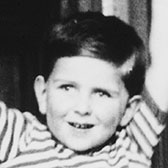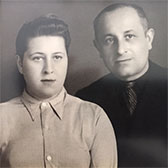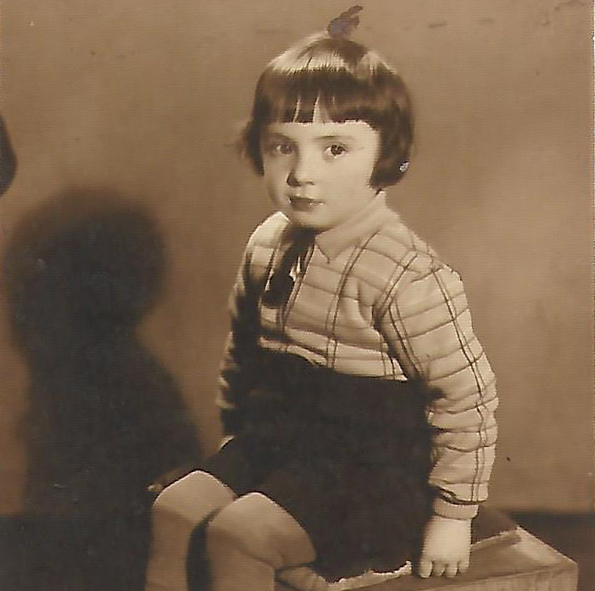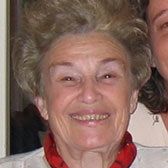Behind Every Name a Story consists of essays describing survivors’ experiences during the Holocaust, written by survivors or their families. We encourage all survivors to share their unique experiences to ensure their preservation for future generations.
The essays, accompanying photographs, and other materials, including submissions that we are unable to feature on our website, will become a permanent part of the Museum’s records.
Read the Essays
-

Jakob Blankitny
It was winter and the cold burned us; all the camp was flooded and muddy. They took our winter clothes and in exchange gave us light clothes that looked like striped pajamas.
-

Rosa Marie Burger
I saw girls weeping—my friends, girls I had grown up with. Their bundles were placed in the last car and the people were herded onto the train. We lived not far from Dachau.
-

Irene (Blász) Csillag
I was born in 1925 in Satu Mare, which was in Romania at that time but in 1940 became part of Hungary. We were four in our family: my mother, father, and one sister, Olga, who also survived and is still living.
-

Miriam (Rot) Eshel
The man photographed us and after a few days he brought the picture … My mother said to us: “We will bury the picture.”
-

Haya Friedman
Marius was the only “humane” being I met during the terrible days of deportation. On a snowy November day in 1944 at Auschwitz ( I was 19 years old), they called us together and crammed us again into railcars, 80 girls in a railcar that was meant for eight horses and sent us away—we didn’t know where, of course.
-

Manya Friedman
I had little confidence when I started. My hands were so shaky I could barely read my own writing. As I started writing, I was given confidence, support, and encouragement. If I can do this, then you can too.
-

Mara Ginic
My throat was parched, the wind blew my hair in my face and obstructed my vision. My knees buckled and the glacier never seemed to end.
-

Andrew Glass
Finding a way to remain in the United States as an illegal alien proved to be one heck of a sweet bargain.
-

Sima Gleichgevicht-Wasser
Sima could easily pass as a non-Jewish Pole because she had a light complexion and was blonde, but to be able to live as a Pole, she needed a Kennkarte (identification card), and to get a Kennkarte she needed a Polish birth certificate.
-

Green and Hoffer Families
My mother and aunt worked for the Russians until my mother was smuggled out of Poland to the American Zone in Germany where she lived in a displaced persons camp, Feldafing, and married my father on October 16, 1946.
-

Grossman Family
Rivka (née Kleinman) Grossman and Mordechai Gimpel Grossman were our parents. Our family lived in the bucolic village of Mad in northeastern Hungary, in the wine country near the Carpathian Mountains—about 100 kilometers north of Debrecen.
-

Miroslav (Fred) Grunwald
As the German army pushed southward, taking over from the Italians, all occupied Adriatic territory, I was suddenly again on the run and in hiding. But this time I was not so lucky.
-

Marian Kalwary
In normal circumstances, time goes fast, but in the ghetto, it dragged exceedingly long. Every day passed very slowly, as if to spite us.
-

Pieter (Peter) Kohnstam
In the morning of July 6, 1942, Anne Frank came to say good-bye to us. The Franks were about to go into hiding in their secret annex. It was a sad and difficult parting for everyone.
-

Joseph Moses Lang
It began in May 1944 when my family and I were told to pack whatever we could carry and we were placed, along with many others, in an old factory building in Targu Muresh, Romania.
-
Sonia Lipowicz
If you were a Jew in Poland in 1939, there was a 2% chance you would survive the Holocaust and live past 1945.
-

Marcel Lob
When Marcel got the news of her deportation, he knew that he would never see his mother again—the person he adored beyond anyone else. It was with a broken body and a broken heart that he arrived in Paris.
-

Ester Lupyan
In the memories of those who lived through the occupation, the recollection of the existence and survival in the ghetto is still frightening. I will only say that out of our family, my mother and I were the only ones to survive.
-

Pola (née Gorzkowska) Nikodemska
My family didn’t hate any race or any human being. Our religion tells us, “Love thy neighbor as thyself.” It was the most natural thing to help another person who needed help.
-

David Parnes
I was 7 at that time. It was in May, about a month before the war broke out (in the Soviet Union the war started on June 22, 1941). In Bessarabia there was an earthquake and it eventually came down to Balti (Beltsi), where my family lived at that time.
-

Heinz Raphael
The Gestapo visited us in the morning. They knew my father from his visits as Seelsorger (minister) to the Jews in the local prison.
-

Barbara Rebhun
I was found in either an empty train wagon, or close to the rail station, by a Red Cross attendant in the little town of Milanówek, about 20 kilometers from Warsaw.
-

Erna Rubin
After three weeks in the ghetto of Czernowitz, we were sent to the camps in Transnistria for three terrible years of poverty, hunger, typhus, and fear for the future. We had hope in our hearts and only that kept us alive.
-

Irene Safran
My journey to Auschwitz-Birkenau began on May 19, 1944, when I boarded the train with my parents, three younger sisters, and two brothers.
-

Simon Family
While in Westerbork, Selma Simon wrote to her daughters, Ruth and Hilda in England. The last letter was written four or five days before they were deported to Poland in which, sadly, Selma said, “We hope to see you soon.”
-

Naki Touron-Fais
In the car I tried to be excited about finally ending this ordeal, but I felt I was dying from agony and fear. I was trying to find a way out. If we went to Lehonia, it would be the end of us. Nobody knew us there. After a while, I asked, “Where are we going?”
-

Agnes Gertrude Wohl
My name is Agnes Gertrude Wohl (maiden name Mendelovits), born in Budapest, Hungary, on March 3, 1933.

